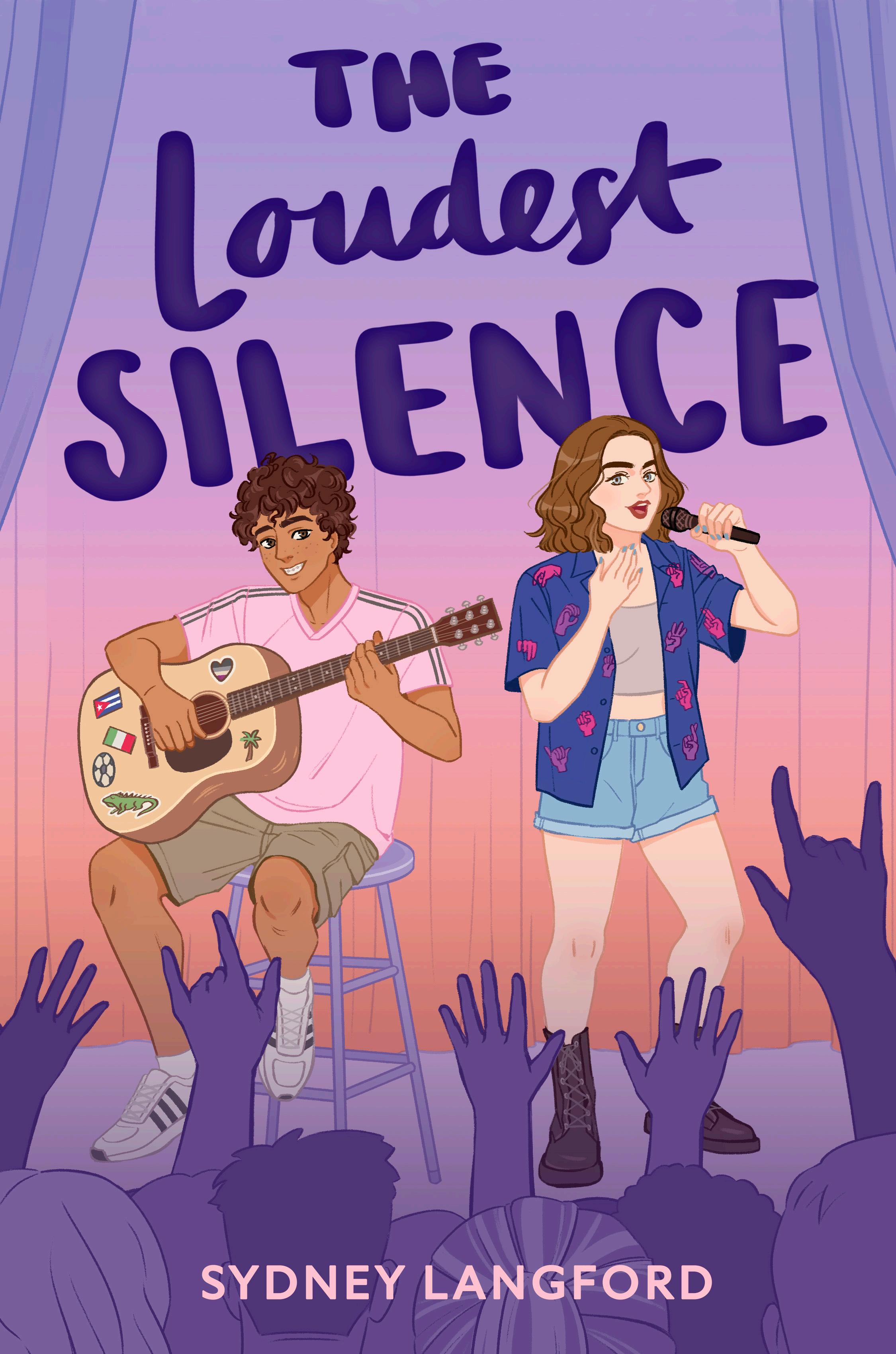
HOLIDAY HOUSE © ALL RIGHTS RESERVED FOR REVIEW PURPOSES ONLY


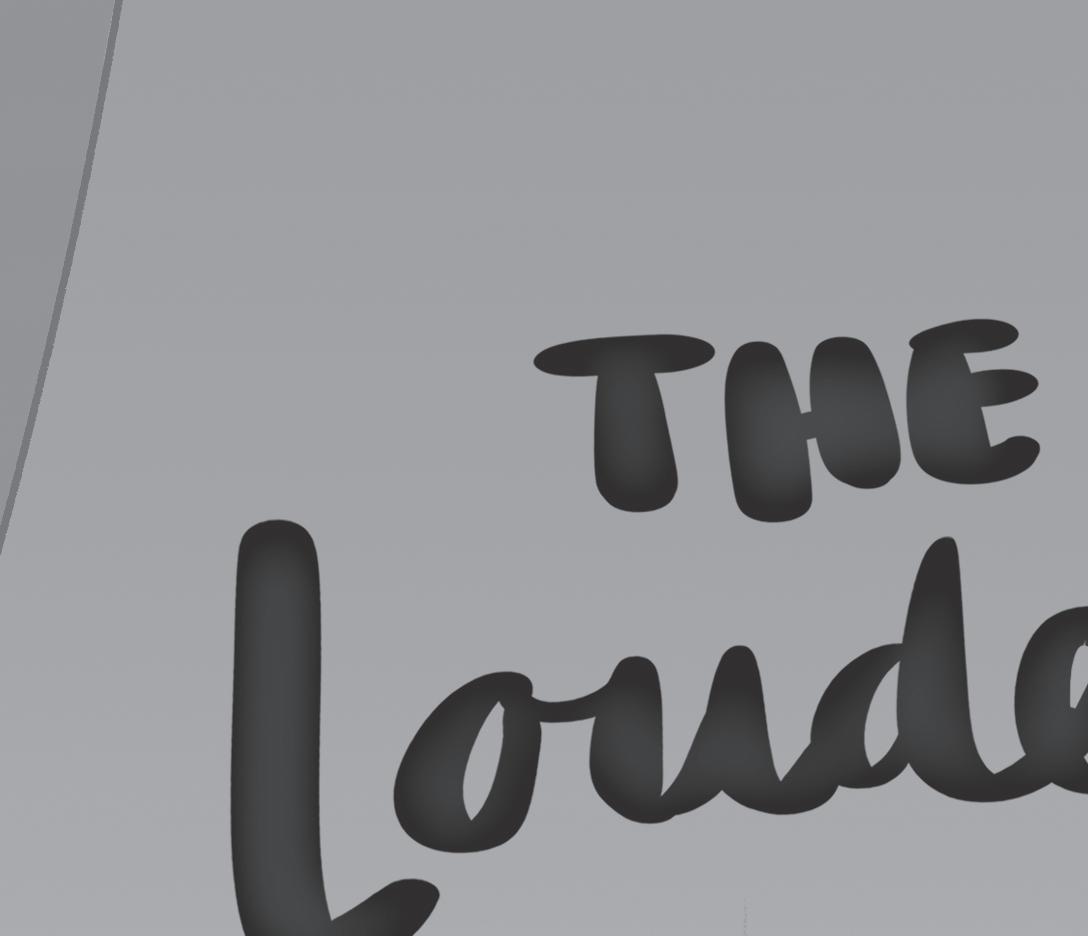




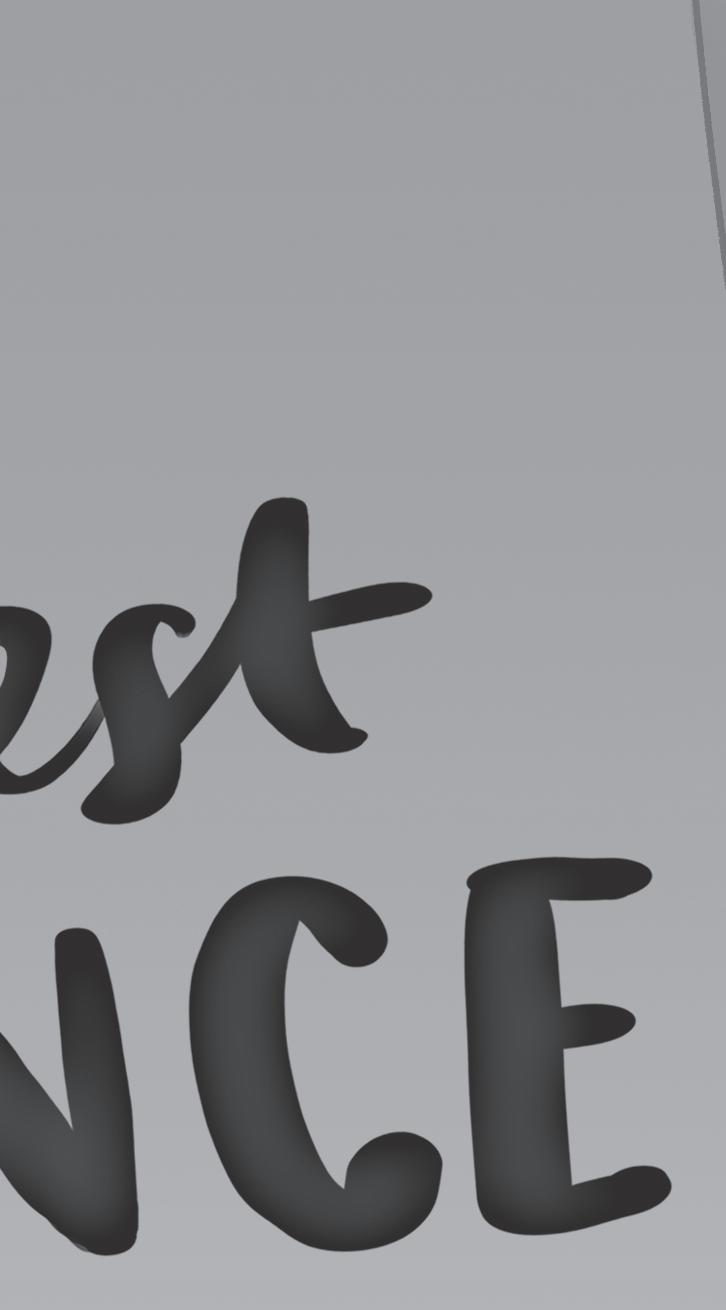




NEW YORK
Copyright © 2024 by Sydney Langford
All Rights Reserved
HOLIDAY HOUSE is registered in the U.S. Patent and Trademark Office. Printed and bound in [TK] at [TK] www.holidayhouse.com
First Edition
1 3 5 7 9 10 8 6 4 2
Library of Congress Cataloging‑in‑Publication Data [TK]
To anyone who has felt unheard, unseen, or lost: Someday, you will find your place and your people.

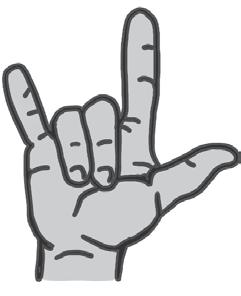

Content Warning: This book includes some themes and/or depictions of anxiety attacks, ableism, grief (non‑death related), and cyberbullying. Please read with care if these topics adversely affect you!

ABCDE




F K P U z G L Q V H M R W I N S X J O T Y

Content note
Note: Sign language, like all languages, is rich and layered. While multiple variations exist, both in the U.S. and abroad, in THE LOUDEST SILENCE, ASL (American Sign Language) and SimCom (simultaneous communication—speaking and signing at the same time) are used.
ASL can be different from place to place or person to person due to factors like regional and generational differences or the use of “English” signs vs. “Deaf” signs. ASL also has different grammar rules and syntax from English. This, plus the fact that ASL is a visual language, means any author representing it on‑page has some (often tricky) creative choices to make.
In THE LOUDEST SILENCE, the descriptions of signing use ASL grammar and syntax. However, ASL/SimCom that has been translated into English uses English grammar and syntax and is italicized. The latter represents an interpretation of what’s being signed but isn’t a literal translation.
Other D/deaf authors may portray ASL/SimCom differently and those creative choices are also valid!
For clarity, bolded and italicized words do not relate to ASL; these are emphasized English words.
Author’s note
Dear Reader,
When I was fourteen years old, I suddenly and unexpectedly lost about sixty percent of my hearing. Fourteen is a difficult age for most people, but when you lose one of your five senses and your world is abruptly and irrevocably changed, it adds a whole slew of complications to an already tumultuous time in your life.
After becoming D eaf H ard of Hearing, I didn’t know where I belonged. I didn’t yet know ASL, nor was I raised in the Deaf community, so I didn’t feel “Deaf enough” for the Deaf world. Conversely, I wasn’t “Hearing enough” for the Hearing world anymore. All of this led to a long grieving period, an element I explore in this book through Casey’s character. Casey’s emotional arc throughout the novel largely mirrors my own experience, and I hope Casey’s and my journey with this particular kind of grief can provide some insight, or even comfort, to others.
While I was grieving my hearing loss, my Generalized Anxiety Disor der reached new heights—something I explore through Hayden’s story. Drawing on my own experiences, I’ve tried to portray what GAD looks and feels like, both to the person experiencing it and to those around them. At times, Hayden’s anxiety may seem disproportionate to what he’s experiencing, but that’s intentional. Those of us with GAD are often extremely anxious about things that other people consider mundane, for reasons that may not be apparent to people without anxiety disorders.
During my first few years of grappling with hearing loss and battling
overwhelming anxiety, books provided my only escape from reality. But the more I read, the more I longed to see myself represented. I craved books about D/deaf teens; anxious teens; messy, chaotic, queer teens. I craved more stories about queer and/or Disabled teens with big, compli cated emotions—anxiety, joy, grief, love. Teens who form unbreakable and unique bonds. Teens who don’t fit into any of society’s neat little boxes.
That’s when the idea for THE LOUDEST SILENCE first came to me: a story about how Casey—a bisexual singer, a girl whose entire world revolved around sound—would cope with the sudden and inexplicable loss not only of her hearing, but of her music. And about how Hayden—an aro ace soccer captain with severe anxiety—could learn to embrace his secret passion for the performing arts.
I wrote THE LOUDEST SILENCE for the anxious, lost, fourteen year old version of myself. I wrote THE LOUDEST SILENCE for Disabled kids struggling to find representation. I wrote THE LOUDEST SILENCE to help introduce able bodied readers to Disabled perspectives they may not have con sidered before. I wrote THE LOUDEST SILENCE to show anyone who has ever felt like they don’t belong that someday they will find their place in this world.
From the bottom of my heart, thank you for letting me share this story with you.
- Sydney Langford

CASEY CHAPTER 1
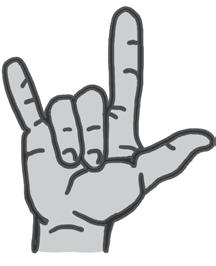
I’M STARTING TO SUSPECT I LIVE IN A COMING‑OF‑AGE MOVIE.
It’s like my entire existence was created in a Netflix writers’ room. I’m the confident, determined, averagely attractive teen girl whose world has been turned upside down in a sudden, unexpected plot twist.
Obviously, it’s just a conspiracy theory I invented to entertain myself during the forty‑seven‑hour drive from Oregon to Florida. But the longer I’m trapped in Mom’s overpacked minivan, the more I grow convinced my life has been scripted by underpaid creatives sitting around a table and brainstorming unbelievable scenarios.
It’s a better explanation than four different doctors saying they don’t know why I suddenly lost fifty percent of my hearing four months ago. Why I went to bed one night with ears that worked fine and woke up the next morning to a muffled world—like I was submerged underwater.
It might’ve been the flu. It could’ve been an underlying condition. Or maybe—just maybe—it was those damn Netflix writers.
“What are you thinking about?” Mom interrupts my riveting inner monologue, her eyes trained to the highway.
“My early‑onset midlife crisis,” I grumble.
I look out the window at the palm trees that blur against the sky as
we glide down the highway. I catch sight of Dad’s car in the side mirror and watch as he bobs his head, presumably to the tune of his obnoxious Polish folk music.
Mom ignores my attempt to deflect, intent on having an impromptu therapy session. “Is this about Dr. Riger?”
A groan escapes me before I can suppress it. Fingers bent in a claw shape, I toss a hand away from my mouth, using American Sign Language to show disdain for audiological exams. “She accused me of faking it, Mom. The world became inaccessible overnight, and Dr. Riger had the audacity to accuse me of faking my hearing loss? Why would I do that?”
Mom eyes me after the outburst but stays silent. I think she knows I’m not actually mad at her, even though it may seem like it. The real target of my anger is the ignorant doctor who performed my latest hearing test. I’m also mad that I can’t effectively communicate, and I’m mad that we’re moving to Florida in the middle of this whole mess. But above all, I’m furious at my ears for deciding to inexplicably crap out on me after a committed sixteen year relationship.
“I’m sick of tests,” I continue. “They all show the same thing. Pro foundly Hard of Hearing.” I say, using SimCom—simultaneous communi cation, or signing and speaking at the same time—for the last words, my horizontal index and middle fingers pressing together as I tap the air in front of my chest twice, moving my hand from left to right. Sure, Mom’s not going to see me signing because she’s driving, but using SimCom is good practice for me.
“No more tests. I promise.” Mom gives me a sad smile, the kind that makes you feel worse than you did before. I’ve drilled into my parents that I don’t want to be patronized, but they can’t help themselves with
2
the sad smiles. “Unless you want a hearing aid.” She curls her thumb and index finger around her ear.
Mom and I have had this discussion at least five times now, and every time, I’ve told her I don’t want a hearing aid—getting one would involve even more tests, then fittings, and there’s not even a guarantee it would help with my type of hearing loss. Why doesn’t she understand that I’m done being poked and prodded?
“No.” I stick my hand in front of her and slam my thumb, index, and middle fingers together like a pincer.
Mom drops the subject, and we drive in silence for the remaining hour. I grab my phone and open Instagram to kill time, deflating a little when I see there are zero new DMs in my inbox.
I click on my most recent story—a picture of the WELCOME TO FLORIDA sign we passed earlier—and confirm that all the “friends” I left in Portland saw it. A lump forms in my throat and I close the app.
Seriously, what did I expect? For the friends who ghosted me after I lost my hearing, the people who abandoned me when I needed more support than ever, to suddenly start messaging me again? For my newly ex‑boyfriend, Victor, who broke up with me because I was “too hard to communicate with,” to stop treating me like a huge inconvenience because I’m no longer able bodied?
Yeah. It’s pretty clear that’s not going to happen.
I shake the thoughts away and focus on the cars whizzing by, the tropical flowers and swaying palm trees that line the highway, and the smell of the ocean. The brightly colored exuberance of Miami is on proud display. It’s a stark contrast to Portland’s weirdness. I already miss it.
The scenery changes as we pull into our new neighborhood. The streets here are incredibly dull and uniform, all white houses with
3
terra cotta roofs, perfectly trimmed green grass, and minivans parked in pressure washed driveways.
I find myself thirsty for another glass of the Miami I saw earlier. Some neighbors wave as we park, and we politely wave back, then make our way inside our prefurnished rental home. The interior decor matches the cookie cutter aesthetic of the neighborhood’s overall design: white, lifeless, and severely lacking originality.
I peer up the staircase that leads to the second floor, then glance back at my parents. “Which room is mine again?” I ask using SimCom.
I probably should’ve watched the 3D tour of the house Mom sent to familiarize myself with the layout before we arrived, but the last thing I wanted to do on the drive was think about my “fun new life in Miami”—as Mom and Dad looove to phrase it, like there’s even an infinitesimal chance I won’t absolutely hate living here.
“It’s the door at the very end of the hallway,” Mom chirps. “It’s a little bare bones right now, but don’t worry, we’ll spruce it up! Make it feel like home.”
“Pretty sure all the ‘sprucing’ in the world won’t make it feel anything like home,” I mutter under my breath.
“What was that?”
“Nothing.” I kick off my shoes, release my sphynx cat, Jell‑O, from her pet carrier, and charge upstairs. I locate the small bedroom at the end of the hall and face plant onto the bed.
Welcome to effin’ Miami.
The scorching sun beats down on Mom’s van as we speed down South Dixie Highway the next day. I blare HAMILTON at a volume too loud for
4
any Hearing person, hoping to avoid a pep talk from Mom. She glances my way but doesn’t say anything.
She’d never admit this, but I think she feels guilty. After all, she’s the reason we’ve moved to Florida mere months after I lost my hearing. The event planning business she works for opened a new branch here and she was handpicked to run it.
Meaning I get to spend my junior year at a new high school three thousand miles away from home. With no hearing, no friends, and a perpetual sunburn. (I have a sneaky suspicion that even if I use SPF 5000 my pale, Edward Cullen esque skin would instantly burn.)
Okay, so, maybe I’m a little upset with Mom. Just a smidge.
Mom reaches over the center console and hands me her phone. The Notes app is open, a message typed out onscreen: I’ll be in meetings all day, but I’ll check my phone during breaks, in case you need me.
I sigh, place the phone in the unoccupied cupholder, and return my attention to HAMILTON
We come to a stop in front of Palmera High School’s front courtyard as “Satisfied” ends. I unbuckle my seat belt and fling open the car door. Before I can make my getaway, though, Mom grabs my wrist.
“Did you read my note?”
“Yep.” I sigh, looking up at the building.
“Don’t be afraid to ask for accommodations if you need them. There’s going to be an adjustment period.” Mom smiles reassuringly. “But you’ve got this, sweetie.”
I give an incredibly forced smile in return. If I had a dollar for every time she’s encouraged me to “be my own advocate” while navigating
5
school as a Disabled person for the first time, I’d have enough for a plane ticket back to Portland.
She holds up her hand, tucking her middle and ring fingers to her palm. “I love you,” she signs.
I half heartedly return the sign as she drives off, then take the world’s deepest inhale and push through Palmera High’s doors.
I keep my head down as I walk toward the front office, doing my best to avoid being noticed by the other students. I thought pulling my hair into a cute messy bun and wearing my favorite shirt—a crop top with a subtle embroidered bisexual pride heart—would give me a much needed confidence boost, but now all I can think about is how my hair is a rats’ nest from the humidity and my top is wrinkled from the way I packed it for the move. It’s less effortlessly chic and more slob who just rolled out‑of‑bed.
We’re off to a magnificent start.
The woman sitting behind the desk looks up at me through thick r immed glasses. “Casey Kowalski?” She smacks on chewing gum between words.
I may be new to this whole Deaf Hard of Hearing thing, but I can tell I won’t be able to understand her when she’s chewing gum. It’s like talking to a baby—complete gibberish.
“Yep.” I mess with the hem of my shorts. “I’m supposed to meet with Audrey Simons. She’s my student guide.”
The woman hands me a piece of paper with my class schedule on it. Her mouth moves, but the words are blocked by the simultaneous chew ing. When I stay silent, she glares at me, lowers her glasses, and points to the chairs behind me. She looks disturbingly like Roz from MONSTERS, INC
“Wait there,” she commands with a grimace.
6
I take a seat and occupy myself by scrolling through TikTok until, a few minutes later, someone materializes in front of me. I look up from my phone, expecting to see Audrey Simons, but instead I’m greeted by a white woman in her mid thirties with a blunt brown bob and a wide smile.
“Hi, Casey! I’m Colleen, the school counselor.” She extends a hand toward me, and I reluctantly shake it. “Principal Vega informed me you’re an IEP student and that you recently became Hard of Hearing.”
I blink up at her, unsure how to respond.
My silence doesn’t discourage Colleen, though. “I brought these for you. Maybe you can give them a read when you have a moment!” She hands me two pamphlets and a thick binder.
I scan the pamphlets first:
SO, YOU’RE THE NEW KID IN SCHOOL: HOW TO MAKE FRIENDS AT A NEW SCHOOL!
SO, YOU’RE AN INDIVIDUALIZED EDUCATION PROGRAM STUDENT: HOW TO BE YOUR OWN ADVOCATE!
The binder is Palmera’s official student handbook, which I assume is full of arbitrary rules about spaghetti straps and dyed hair.
“If you need anything, please stop by my office. I want to support you however I can during this tough time in your life,” Colleen says.
“Uh. Thanks ? ” I murmur, glancing around to ensure nobody is watching. All I want is to lie low, and lying low doesn’t typically include a personal greeting and public discussion of your IEP accommodations from the school counselor.
Colleen flashes another smile and makes her exit.
Forty five minutes later, I’m still waiting and have missed first period. Bored with TikTok drama, I get up and peruse the bulletin board hanging in the office. It’s cluttered with flyers: a school bake sale, dance lessons, the ASL Club.
7
I take a closer look at the ASL Club’s flyer. There’s a picture of a white girl signing “I love you” front and center, with a caption underneath that identifies her as Audrey Simons, president of the ASL Club.
Her picture looks overly Facetuned to me, but nevertheless, I’m excited to meet Audrey. I’ll finally have someone to use sign with.
The next thing that catches my eye is a flyer for the Rossi Music Studio. My eyes scan the text: VOICE LESSONS FOR ALL AGES, GENDERS, AND SKILL LEVELS! CUSTOMIZED TO FIT YOUR NEEDS!
I’m about to rip off one of the tabs with contact information at the bottom of the page, but I stop myself. My mind flickers to Laurel, my vocal coach back in Portland. I had been working with her for six years, and I really believed she could help me develop a career in music.
But three months ago, Laurel said she had to drop me as a student because she couldn’t meet my “growing needs.” (Which is code for: “You lost your hearing, and I don’t know how to accommodate that.”)
The subtlest of ableism. Truly artful.
My world was upended when my hearing deteriorated, but the thing that hurts most is that I lost my voice, my art.
I started singing my own songs almost before I learned how to talk. Music was my only way to explore challenging situations and express my emotions. I shaped my happy moments into verses and hid my deepest secrets in bridges. I wove my soul into the choruses I wrote. My life was a song.
But without sound I’m not sure how that song can continue playing.
I turn away from the bulletin board empty handed. My fist clenches by my side as I sit back down, trying to set aside the bitterness swirling in my head.
Audrey Simons shows up, finally saving me from Roz’s evil eye.
8
She flips her bleached blonde hair over her shoulder, smiles like the Cheshire cat, waves a perfectly manicured hand, then begins signing at the speed of light.
I stand up, slack jawed and utterly lost. “I’m not fluent in ASL,” I breathe, oddly embarrassed to admit that.
Audrey’s smile turns into a deep frown. “Oh. But they said you’re deaf.”
“I am.” I cringe. “But I only lost my hearing four months ago. I’m still learning ASL.”
She shakes a ‘V’ in front of her mouth. “Do you lipread?”
Fingers extended, I swivel my right hand side to side. “Kind of.” I shrug. “Just face me when you talk. And speak normally. Not too quickly, but not slowly.”
Audrey pastes her smile back on, but her eyes scrutinize me. “No problem.”
Though, as it turns out, it is a problem.
During our school tour, which causes me to also miss second period (I get the impression Audrey is using this as an excuse to skip class), she randomly yells at me every time she remembers I’m Deaf Hard of Hearing and occasionally makes eccentric hand gestures that even a beginner can tell aren’t ASL. I wince as she shouts explanations about how the classrooms have names instead of numbers: Einstein, Aristotle, da Vinci.
Everything about Audrey rubs me the wrong way, so when third period finally arrives and ends the tour, I send a silent thanks to the universe. If class gets me out of Audrey’s shouting range, I welcome it.
As part of my IEP, all my teachers provided me with work packets ahead of class to assist me in comprehension of lessons, but I’ll stand a better chance at catching some of the in‑class content if I’m close
9
to the teacher. I walk to the front of the classroom and stake my claim on a desk.
Moments after I sit down, someone stands in front of my desk. I look up to find a pair of fierce brown eyes glaring down at me.
“Hey, new girl. This is my seat,” the boy’s voice booms. Scary for most people, helpful for me. “Move.”
He sports a douchebag buzz cut, a silver cross necklace, and a thin black tank top that not so subtly displays biceps he could bench press a Mack truck with. Ugh. I have a feeling this dude is the same breed of entitled, lunch money stealing, desk claiming jerk that every American high school is equipped with. He also reminds me of my jock ex, Victor (look, I haven’t always made smart choices), which automatically makes him one hundred percent more annoying.
“Says who?” I shoot back.
Bitchy Hot Guy taps the desk with a grating scowl. I look down and run my fingers over the desk’s DIY engraving.
Property of César Ramirez
“Fairly certain this desk belongs to the Miami Dade school district, Caesar.” I cross my arms.
One of his thick brows shoots up. “It’s——”
I blink at him, trying to figure out what he’s getting at. “What?”
He repeats himself, but I still don’t understand.
“Write it down, if you must.” I cock a brow, slide him my notebook and a pencil, and re‑cross my arms as he scribbles something in the corner of the page.
He shoves the notebook toward me with all the annoyance he can conjure up.
SAY- ZAR
10
Even his handwriting is packed with anger.
“Not ‘see zur,’ ” he spits mockingly. His biceps flex as he crosses his coppery tan arms, mirroring my pose.
“Okay, fine, César. But you’re still not getting the desk.” I roll my eyes, which only adds fuel to the fire.
“——yuma.” I don’t catch the beginning of his sentence, but his eyes have darkened, and his jaw is clenched. Clearly, he doesn’t like his authority being tested.
“César!” A voice calls out from behind me. I turn to find a shorter, scrawnier boy jogging toward us. He nudges César when he gets close enough. “Leave her alone, she’s——” the rest of his defense is unintelligible.
Scrawny Boy pushes a swath of brown curls out of his eyes and steps between me and César. “Sorry about him.”
I stay silent as I watch César stalk to the back of the classroom, brooding like a bad boy stereotype.
Scrawny Boy nervously smiles at me. “I’m—”
His introduction is cut off by—I c heck the name on my class schedule—Ms. Ochoa entering the room, loudly clapping to get our attention. “Sit down. All of you.” Her voice is nasally, but it carries well. I can work with that. Scrawny Boy scurries off and sits at the desk next to César.
“Welcome to my advanced algebra class, Ms. Kowalski,” Ms. Ochoa greets, then leans next to me and lowers her voice, which makes her impossible to understand. Not wanting the class to hear whatever private thing she’s sharing with me, I social bluff and nod, pretending I can understand what she’s saying.
She claps my shoulder as she stands, satisfied by my reaction, then starts talking about quadratic equations or something.
11
Unfortunately, when the bell rings, my notebook is empty. I didn’t catch anything Ms. Ochoa relayed because of her fast paced speech.
Trying my best to not act crestfallen, I sling my backpack over one shoulder and head to lunch. My ears throb with sensory overload as I step into one of the busiest cafeterias I’ve ever seen. Tugging my backpack straps a little tighter, I swallow my discomfort and squeeze into the lunch line.
I glance around the room as I wait in line, my eyes jumping from person to person, but I focus when I make eye contact with Scrawny Boy from advanced algebra. He offers me a shy wave, but his hand is slapped out of the air by César, who sits across from him. There are three other people at their table, but I don’t recognize them.
Before I can decide whether or not to wave back, Audrey suddenly appears in front of me.
“Casey!” she shouts, inches away from my face. “The ASL Club is meeting during lunch. You should come!”
That’s more a command than a request, as it turns out. As soon as we’ve both received our trays of unidentifiable sludge masquerading as food, Audrey steers me back out of the cafeteria and into a small classroom I haven’t been in yet. The walls are decorated with finger spelling charts and ASL posters as well as some French and German posters—this room must house all the foreign language classes. The desks have been pushed to the edges, and a dozen students sit on the floor in the open space, conversing in sign.
It’s a nice classroom, and I can picture myself practicing sign here, but the ASL teachers at Palmera are all Hearing, so my family signed up for lessons at the University of Miami—with a Deaf professor—instead. My tutor back in Portland was Deaf, and she suggested I continue learning
12
ASL from a Deaf teacher since I specifically want to learn Deaf culture and slang and to be a more authentic signer.
“Everyone! This is Casey!” Audrey announces.
“Hello,” I sign timidly, balancing my lunch tray with one hand.
A Black girl with wiry curls and cat‑eye glasses smiles up at me and her fingers fly through the air at a breakneck pace. I barely catch her fingerspell her name: “J-E-S-S-I-C-A.”
The other students introduce themselves, but the only other name I make out, Marco, belongs to a boy who gives off major asshole‑supporting‑character‑from RIVERDALE vibes as he smirks and speeds through his signs.
“Casey——new members——I think you beginners will really get along,” Audrey tells me, some of her words cutting out. She gestures to a group of students in the far back, all of them sporting deer‑in‑headlights expressions as they observe the rapid signing.
“Oh, uh nice.” I gulp. “Are any of you Deaf or Hard of Hearing?” I ask using SimCom.
Asshole‑Marco scoffs. “Hell no. I’d go psycho if I was deaf !” H e guffaws, clearly thinking that’s a totally funny and not at all ableist joke.
I grit my teeth. “So, what inspired you to learn sign?” I narrow my eyes. I have a gut feeling I’m not going to like his answer.
“Looks great on college applications.” He smirks. “Plus, ASL class is an easy ‘A,’ unlike the real foreign language classes.”
Ding, ding! My hunch was correct. An absolutely garbage answer!
I look around the room to see if anyone else is offended by his ignorance, but they don’t acknowledge it at all. Marco strikes up a conversation with Audrey as if nothing happened, that infuriating smirk still on his face.
13
Blood boiling, I scoop up my backpack and leave. I’m not putting up with this bullshit. Plus, all the auditory input from trying to track several different conversations has triggered an excruciating headache.
My head pounds as I slam the door shut behind me, angry and exhausted. The hallway is peaceful and soundless, so I sit, trying to talk myself off the edge and lessen my tiredness.
I only get a few minutes of rest before the bell rings. Battling an unresolved case of auditory fatigue, I trudge toward my next class, resigned to the fact I have no hope of absorbing what any of my teachers are saying for the rest of the day.
Sure enough, when the final bell rings, all I have to show for my first day at Palmera High is a heavy heart and a killer headache.
14

HAYDEN CHAPTER 2

MIAMI’S BEST WEATHER IS IN EARLY SEPTEMBER. IT’S THE KIND OF HEAT that surrounds you, the air thick as mirages roll off the sidewalk.
Unfortunately, for me and the rest of the Barracudas—Palmera High’s fútbol team—early September means it’s time to start getting ready for the upcoming fútbol season. There’s nothing like four weeks of fútbol boot camp to make those tropical temperatures lose their charm.
I make my way toward the pitch, weaving past my teammates as they dart around the field, stretch, and lace up their cleats. My pace quickens when I notice Coach Ramirez glaring at me and checking her watch. I’m only a few minutes late, but she demands her players be punctual. I feel like it shouldn’t matter if I’m a bit late today, since this month‑long skills workshop is optional—our official season doesn’t start until October. But when Coach says something is “optional,” she really means “not optional at all but I can’t legally say that.”
Coach raises a judgmental brow. “Get lost on the way here?”
“Lo siento, Coach,” I mumble an apology and jog over to where my sixteen‑year‑old cousin sits on the sidelines, flipping through a smutty romance novella. “Lela, did you take notes during language arts?”
She nods, still reading.
“Could you text them to me?”
“Why do you never take your own notes?” She dog ears her page and looks up. “What would you do if I weren’t here?”
“I dunno.” I shrug. “Fail language arts?”
“I am criminally underappreciated,” she laments. “I’ll send them later.”
“Thank you! I love you!” I call out as I head onto the pitch. A few steps in, I spot my younger brother, Dino, doing some warm‑up exercises.
“What exactly are you doing?” I ask him.
“Joining practice!” he exclaims, as if it’s obvious.
“You’re not even on the team, Dino.”
He rolls his eyes. “Coach said I can join the boot camp since it’s supplemental. Plus, the extra training will give me a better chance at making varsity.”
It’s almost unheard of for a freshman to make varsity, but Dino is nothing if not cocky. I sigh but squeeze my younger brother’s shoulder in encouragement.
Near the center circle, I sidle up to my best friend, Paz. He grins at me and bounces a soccer ball on one foot. “You excited? First fútbol session of the school year!” he singsongs, eyes shining.
“Yeah. Ecstatic.” I gulp.
“Hey.” Gabriel Cuevas, the Barracudas’ goalkeeper, nudges me. “Henry scored a pretty sick goal the other day, huh? Do you think he has a shot at the Golden Boot award this year?”
I pick at a hangnail and avoid answering the question about my other brother.
Enrique González Rossi: the eighteen year old Cuban Italian Amer ican kid who earned the moniker Hat Trick Henry in high school and subsequently caught the attention of David Beckham himself. Soon after,
16
Henry was drafted by Inter Miami CF and rose to local fútbol fame. You know, normal teenager things.
Paz jabs my rib cage after an uncomfortable silence. “Golden Boot . . . yeah that’d be cool,” I mumble.
“Yo, Hayden!” Jacob Miller runs up and joins us; he claps my shoulder as if we’re best friends. “How’s Henry doin’?”
My jaw becomes concrete as Henry is name dropped for the thou sandth time today. “I dunno, Jacob. You’d have to ask him yourself,” I bite.
Jacob and Gabriel continue bombarding me with questions about Miami’s Golden Boy; I stare at the artificial turf and try to steady my shaking hands.
Truth is, I don’t really know how Henry’s doing. We haven’t had a meaningful conversation in months. He calls our mom every week, and when she hands me the phone we exchange pleasantries—“Hi, kiddo, how are you?” “Good. You?” “Good.”—then hang up. It’s nothing like it used to be. We’re nothing like we used to be.
Now, instead of taste testing new recipes for our dad’s restaurant, teaming up with me to tease Dino, or commiserating when our parents chew us out for something, he’s training (and hanging) with some of the biggest names in fútbol—Messi and Beckham, anyone?—and is appar ently too busy to even acknowledge, much less spend time with, his own brother. It’s like signing with an MLS team changed his family tree.
I’d be lying if I said it doesn’t sting every time his name comes up and I’m reminded that my best friend, my big brother, became a stranger practically overnight.
“Everyone, pay attention,” Coach booms, her voice cutting through my wandering thoughts. Her dark eyes snap from person to person. “As you’re all aware, the Barracudas have won the state championship
17
for the past three years. And most of the star players who made that happen have now graduated. Including, of course, our former captain, Henry González‑Rossi, who went and earned himself a spot at Inter.”
Can we seriously not go five minutes without Henry being mentioned?
“You boys have some major shoes to fill, and over the next four weeks, I’m going to get you into shape so that you can actually fill them. I will not let you sorry excuses for fútbol players break our streak.”
“With the captaincy vacant,” Coach continues, “we need to decide who will lead us to our fourth state championship.” She steps away from the huddle and confers with her clipboard. “I’ll read the names of the top three choices submitted by the team earlier today, and then, by a show of hands, you’ll vote for your new captain.”
“But Coach,” says Nathan Nakamura, one of the seniors, “the whole team isn’t here to vote.”
Coach glares at him. “Well, if they wanted a say, they should’ve come to practice, Nakamura. Even Dino came”—she gestures to my little brother—“and he’s not an official team member yet. That’s the initiative you guys need to be showing. Do I make myself clear?”
Everyone mutters yes.
“Your choices are,” Coach reads off her clipboard, “Jacob Miller, César Ramirez, and Hayden González‑Rossi.”
My eyes bug out of my head when my name is announced. Jacob is a good offensive midfielder and would make a fine captain. And César is a no brainer—he’s the best player on the team, and everyone seriously respects him. (Plus, well, I don’t want to discredit him, but he also happens to be Coach Ramirez’s son. Nepotism is alive and well. That’s all I’m sayin’.)
18
But me? I’m not captain material. I don’t even think anyone on the team besides César and Paz acknowledged my existence until Henry became a local legend, and I was fine with that. I don’t like being in the spotlight.
I have a feeling I was only nominated because of my now legendary family connections.
Maybe I’m the nepo baby.
“Now you vote.” She begins calling names. “Jacob Miller.”
I scan the crowd. Not a single hand goes up.
“César Ramirez.” Coach glances at her son, and for a fleeting moment, she looks proud.
I smile at César and raise my hand. He nods at me curtly, acknowl edging my vote. Then he looks toward the rest of the team, and his lips curl into a scowl. I’m the only one with my hand raised.
I lower my hand and swallow heavily at the unexpected result, but before I have a chance to dwell on the election outcome, Coach calls my name. My stomach twists into a knot as everyone’s hands shoot up. I have no doubt I owe this to Henry’s celebrity status.
“Congratulations, Captain.” Coach smiles at me for half a second, then sends us off to run drills. Endless drills.
Unease nags at me about being elected captain of Palmera’s fútbol team—a position I never aspired to, in a sport I don’t want to play—as Dino and I push through the doors of El Pollo Cubano, the restaurant my dad and uncle run on Calle Ocho.
A cloud of cool air smacks me in the face as the restaurant greets me with the powerful scent of cumin and freshly chopped cilantro. I hear the sound of buñuelos sizzling in the deep fryer, so loud it’s audible over the music flowing from the speakers.
19
My dad is standing in the dining area, beaming at the wall where family photos are proudly displayed. “Congratulations, Captain González Rossi!” he bellows as soon as he spots me, announcing my new role to the whole restaurant. A few confused customers clap.
Crap. Coach must’ve told him. There’s a lot of downsides to your fútbol coach also being your aunt, but the biggest one is definitely that everything that happens during practice is immediately shared with the entire family.
Papá motions me over. My feet drag and nerves bubble up as I slowly walk toward the photo wall. Dino trails behind me.
I freeze as soon as I spot Papá’s newest addition to the “Wall of Fame” that’s always showcased the three generations of male González fútbol players in their proudest career moments: my abuelo, my dad, Henry and now there’s a fourth frame.
Me.
Every muscle in my body locks up, and my heart beats faster. In the picture I’m in my Barracudas jersey, sporting the world’s fakest smile—my solo portrait taken during the team photoshoot last year. Before Henry was drafted. Before I was captain. Before I unwillingly completed the next step toward a family legacy.
My eyes wander to Henry’s photo. He’s wearing his iconic pink Inter Miami jersey and standing in between Beckham and Messi, grinning. (Because of course it’s a photo of him in his Inter jersey with the legend ary David Beckham and Lionel Freaking Messi.) Next to Henry is Papá’s picture from when he was captain of the Barracudas during his senior year, right before he got his career ending injury.
Lastly, I glance at Abuelo’s picture. Behind the polished glass, he’s beaming alongside his teammates on the Miami Toros, one of Miami’s
20
very first professional fútbol teams. The photo was taken in the seven ties, when he was just a little older than Henry and had only recently immigrated to Miami. He left his home country to pursue a dream of playing professional fútbol, and I’ve always been in awe of the bravery that must have taken. I wish I was even half as brave as Abuelo.
Blurry childhood memories always come rushing in whenever I look at pictures of him: Abuelo teaching six year old Henry and four year old me how to bounce a soccer ball on our knees; Abuelo chuckling when I said he was the greatest player of all time; his colorful stories about being part of the early days of fútbol in Miami, starting his family, coaching two generations of Youth League fútbol teams; his former teammates sharing their own stories about him at his funeral eight years ago.
I choke back tears as I blink at the photo. Abuelo was courageous and passionate and never gave up on his dreams. He was everything I’m not. Everything I’ll never be, because all his bravery and confidence and enthusiasm for fútbol seems to only have been inherited by my brothers.
Papá clasps my shoulder, pulling me away from the photos. “I’m proud of you. And your abuelo would be too—I know he’s watching over you.” A bittersweet smile crosses his features as he looks at his father’s picture. “You’re carrying on the dynasty!” he says, turning back to me. There’s a joking lilt in his voice, but the statement triggers a clammy, cold sweat to crawl across my skin.
Dynasty. Pride. Captain. Abuelo. Henry. Fútbol. Fútbol. Fútbol.
The words echo inside my head. I squeeze my eyes closed and beg my brain to shut up (it’s never worked before, but I might as well try).
“Okay, enough chit chat.” Papá interrupts my regularly scheduled identity crisis and I peel my eyes open. “Get to work!” He claps his hands and ushers Dino and me into the kitchen.
21
After putting on an apron and a hairnet, I seek solace in the walk‑in freezer. I cool off next to a rack of ribs and take a deep breath. My peace lasts all of two minutes before Papá comes barreling in.
“¡Oye, mijo! My freezer is not for recreational purposes.” He bal ances a fifteen pound bag of rice on his hip. “I don’t pay you to stand around, do I?”
Papá lightly smacks the back of my head as I exit the freezer and step into the kitchen. I wash my hands before heading over to monitor an industrial mixer that combines ingredients for buñuelos. I stand next to Dino as he assembles a to‑go container of ropa vieja.
“How did fútbol practice go, Dino? You still going to try out for varsity next month?” Tío Eddy asks from where he’s hunched over the stove, dumping a slew of aromatic spices into a skillet.
I’m pretty sure my family is physically incapable of going ten minutes without talking about fútbol.
“Oh, yeah. César says I’m a shoo‑in!” Dino calls out. He slides the sealed takeout bag toward the to‑go section of checkout. “And Tía Carmen—I mean, Coach,” he corrects, “told me my ‘hocus pocus’ needs work but that it has the potential to be on par with Henry’s.”
“¡Que chévere! When Captain G onzález Rossi”—Papá winks at me—“is drafted to play for Inter Miami, perhaps you’ll become captain!” He grins at Dino. “Your destiny will be fulfilled.”
I try to ignore the spike in my heart rate and focus my attention on preventing the buñuelo dough from becoming too chewy.
“I mean, we are the ‘Floridian Broldans.’ ” Dino smirks as he assem bles an order.
My family has been joking for years that Henry, Dino, and I are “The Floridian Broldans.” The nickname stems from the “Brothers
22
Roldan”—Cesar, Cristian, and Alex—who have all garnered a reputation in the professional fútbol world.
That makes me Cristian, the middle brother and the most attractive out of the three. Though, with my Dumbo ears and braces, I’m hardly the best looking González Rossi brother.
“You’re nowhere near as talented as Alex Roldan, Dino,” I mumble, more bitterly than I intended.
“Boys, don’t bicker,” Papá chides. “Hayden, check on table six.” He hands me a tray of water glasses.
Balancing the tray in one hand, I walk into the dining room and head for the table near the window where my cousins and best friend often hang out.
“Congratulations, Captain!” Lela exclaims while snagging a glass from the flimsy serving tray.
“Yeah, congrats,” César snarls. He’s usually in a surly mood, but today he has a valid reason. I stole his rightful position as team captain.
“I’m sorry, César,” I mutter. He doesn’t look at me. “I‑I voted for you.” He finally makes eye contact. “Nobody else shared your sentiment.”
“To be fair,” Lela says to her older brother, “you’re already captain of the béisbol team. Don’t get greedy!”
His focus snaps to her and he narrows his eyes. “Yeah, but I’m trying to get a fútbol scholarship, not a béisbol scholarship. There’s just not enough money in college béisbol to go around, and I need a scholarship or I can’t afford to go at all.”
I wish I could tell him how this situation has screwed us both over. But instead, I let silence engulf the group.
Thankfully, Paz is unrivaled when it comes to breaking through awkward tension. (Probably because he’s usually the one who creates it.)
23
“Sooo, who’s the new kid you saved from Cécé in Ms. Ochoa’s class?” He waggles his brows and smooths his crisp white polo shirt. He says it makes him look sophisticated, but we all think it actually makes him look like a forty something year old who plays golf when he should be spending time with his children.
“Dunno what you’re talking about,” I mutter.
“You liar! The cute white girl with the mousy brown hair that’s in desperate need of some layers and highlights? Or maybe balayage?”
“Hm. Doesn’t ring a bell. Anyway, three cubanos and a round of tostones?” I ask, not wanting to get dragged into their gossiping. César grumbles something bordering approval. “Great, I’ll be back shortly.”
But before I can leave, Lela’s pointy witch nails dig into my wrist as she grabs hold.
“Hay,” she says, blinking up at me. “Aren’t you curious?”
I pull out a chair and plop into it. “Fine. What’s her deal?”
A grin appears on her face. “Her name is Casey Kowalski. She moved here from the West Coast—”
“Did you see her bi pride shirt?!” Paz interrupts enthusiastically. “It makes sense. I mean, basically everyone from the West Coast is at least a little bit bi, right? Hey, don’t look at me like that! True fact.”
“Shut up, Paz.” Lela rolls her eyes. “Anyway, her family moved because her mom got a job here. She’s a wedding planner, I think?”
“God, I hope she really is bi,” Paz mumbles. “Heteros scare me.”
César flicks Paz’s arm from across the table. “That’s heterophobic.” Paz blows his straw wrapper at my ill tempered cousin.
“Lela,” I say, “how do you know all of this?”
She waves a dismissive hand. “I know everything. Ah! She also has
24
a cat named Jell‑O, who is the ugliest creature I have ever seen, yet has a certain charm to her.”
“Aw, like Cécé!” Paz teases, reaching over and pinching César’s cheek.
César slaps Paz’s hand away, his nostrils flaring. “Vete pa’l carajo.”
“Okay. well, thanks ” I stand up and remove myself from the situation.
César only tolerates my best friend because he knows Paz and I have been a package deal since we bonded over our mutual love of Lizzie McGuire while swinging on the monkey bars in second grade. Unfortunately, they’ve been getting on each other’s nerves ever since.
Paz is truly the Lizzie to my Miranda. (He wouldn’t be caught dead as a side character. He has main character energy—according to him.)
Hanging out with César, on the other hand, has always been more of a requirement, since he’s my cousin. Recently, though, we’ve grown a lot closer. He’s been filling the suspiciously big brother shaped hole in my life ever since Henry left.
“For table three,” Tío Eddy hands me a tray with two bowls of steam ing ropa vieja. The scent makes my mouth water as I squeeze through the tight passageways between tables. I deliver the food to the Gómezes, an elderly couple who’ve eaten at the restaurant since the day it opened.
I entertain their questions as they tuck into their dinner. That’s the common courtesy rule with old people. You let them kiss your cheeks and ask invasive questions. Even if your three best friends are watching you squirm while Mrs. Gómez asks if you have a girlfriend.
After we close the restaurant, César, Lela, and Paz eat the leftover buñuelos while Papá and Tío clean the kitchen and Dino sweeps.
25
Taking the opportunity to peruse Instagram, I type in “Casey Kow alski” with many different misspellings of the last name before finding her. Her account is public and has over two thousand followers. Inter estingly, the account is a business account and she identifies herself as a musician.
Her grid is beyond aesthetically pleasing (besides pictures of her hideous cat). An even mix of pictures and reposted TikTok videos, all with the same filter added. I click the latest video on her timeline and discover that she hasn’t posted since May. Huh.
The clip is a rendition of “On My Own” from LES MISÉRABLES . Her singing is silky and powerful, and I hum along, tapping out the notes on my leg as if I were pressing piano keys.
“Finish the dishes. Don’t make me fire you.” Papá’s brisk tone snaps me out of the trance Casey’s singing put me in.
I scramble to mute the video, not wanting him to catch me watching it. I press the Follow button underneath her bio and smile as I hop to my feet, grab the sponge near the sink, and start on the grease coated pans, humming “On My Own” as I scrub at the grime.
26
























